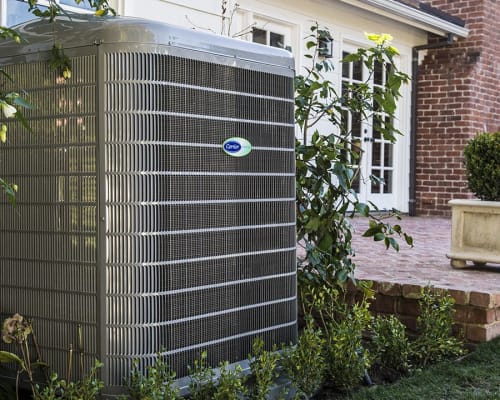Are you considering a heat pump installation to help save energy and money?
Here at Cooper Mechanical, we are your experts in all things HVAC, and we’re here to guide you through the world of heat pumps. In this comprehensive guide, The Coop will cover what a heat pump is, how it works, the benefits of air-source and geothermal heat pumps, ideal locations for heat pump installations, and why heat pumps are more efficient than traditional heating and cooling systems.
If you’re ready to learn how a heat pump system can revolutionize your home comfort and energy efficiency, check out everything you need to know about heat pumps from The Coop!
What Is a Heat Pump?
A heat pump is a highly efficient heating and cooling system that can both warm and cool your indoor space. A heat pump works by transferring heat from one location to another, allowing you to enjoy a comfortable environment all year round. Unlike conventional heating and cooling systems, a heat pump system doesn’t generate heat but instead moves it from the outdoor air or the ground to heat or cool your home.
How Do Heat Pumps Work?
A heat pump system works through a cycle of compressing and expanding refrigerant, which absorbs and releases heat. During the winter, it extracts heat from the outdoor air or the ground and transfers it indoors to heat your home. In the summer, the process reverses, expelling heat from your home to keep it cool. This efficient method of transferring heat makes heat pumps an environmentally friendly and cost-effective choice.
Air-Source Heat Pump
One of the most common types of heat pumps is the air-source heat pump, which extracts heat from the outdoor air. This type of heat pump is suitable for most regions in the U.S. and offers significant energy savings compared to traditional heating systems. To learn more about air-source heat pumps, click here.
Geothermal Heat Pump
A geothermal heat pump, also known as a ground source heat pump, is an excellent choice in any climate. It harnesses the stable temperature of the earth’s subsurface to efficiently heat and cool your home. Geothermal systems are incredibly energy-efficient and have a longer lifespan than traditional HVAC systems because the entire system is located inside so it doesn’t experience the wear and tear of conventional systems. For in-depth information on geothermal heating and cooling, visit our page here.
Do Heat Pumps Work in Bucks County & the Surrounding Areas?
If you’re a resident of the Bucks County area, you might be wondering if heat pumps are a viable HVAC solution for your location. The answer is a resounding “Yes!” Heat pumps are well-suited for regions with a climate like Doylestown, New Hope, Upper Bucks, and the surrounding areas. These units have evolved tremendously over the last 20 years and provide superb heating and cooling capabilities as well as excellent energy efficiency.
What’s more, Cooper Mechanical installs variable multi-speed heat pumps, also known as inverter heat pumps, that can operate effectively and efficiently down to single-digit outside temperatures.
How Does a “Heat” Pump Cool a Home?
You might be wondering, “If it’s called a ‘heat’ pump, how does it cool my home?” Well, it’s an excellent question, and the answer lies in the remarkable versatility of these systems.
A heat pump can efficiently cool your home by utilizing a simple yet effective process. Here’s how it works:
- Refrigerant Cycle: Just like during heating, the heart of the heat pump’s cooling process is its refrigerant. This refrigerant is responsible for absorbing and releasing heat, and it plays a crucial role in maintaining your indoor comfort.
- Heat Absorption: When you switch your heat pump to cooling mode, it reverses the refrigerant cycle. Now, the heat pump’s outdoor unit acts as the condenser, and the indoor unit becomes the evaporator coil. The evaporator coil absorbs heat from the indoor air, making it cooler.
- Heat Dissipation: The absorbed heat is then transported to the outdoor unit, where the refrigerant releases it into the outdoor air. This process effectively removes heat from your indoor space, leaving you with cooler, comfortable air.
- Recirculation: The cooled air is then circulated throughout your home through the ductwork, providing a refreshing indoor climate.
Why are Heat Pumps More Efficient Than Traditional Heaters and Air Conditioners?
Heat pumps are renowned for their energy efficiency. Unlike traditional heating systems that rely on burning fuel, heat pumps transfer heat, making them eco-friendly and cost-effective. Additionally, they can operate in both heating and cooling modes, eliminating the need to install separate systems for each season.
- Heat Transfer: Heat pumps operate on the principle of transferring heat, rather than generating it. This means they extract heat from the air or ground in heating mode and release it into your home, and in cooling mode, they remove heat from your indoor space and release it outside. This heat transfer process consumes significantly less energy than burning fuel or generating heat.
- Versatility: One of the standout features of heat pumps is their ability to work as both heating and cooling systems. This versatility often eliminates the need to install separate systems for heating and cooling, saving you money on equipment and installation costs. It also simplifies maintenance and reduces the space required for HVAC components.
- Consistent Efficiency: Heat pumps maintain their high-efficiency levels even in challenging conditions. While traditional heaters and air conditioners can struggle in extreme temperatures, heat pumps continue to operate efficiently, thanks to their heat transfer technology.
- Reduced Environmental Impact: Heat pumps produce fewer greenhouse gas emissions compared to traditional systems that burn fossil fuels.
- Lower Operating Costs: With their energy-efficient operation, heat pumps can lead to substantial savings on your energy bills over time. Their ability to provide both heating and cooling with minimal energy consumption means you’ll enjoy year-round comfort without breaking the bank.
Contact The Coop For the Latest Information on The Benefits of Installing a Heat Pump!
Ready to make the switch to an energy-efficient and cost-effective heating and cooling solution? Contact Cooper Mechanical today to learn more about the numerous benefits of installing a heat pump system, including inverter heat pumps which offer outstanding efficiency and flexibility. Our experts are here to answer your questions, provide personalized recommendations, and ensure your home stays comfortable year-round. Get in touch with us here to take the first step towards a more energy-efficient home.
FAQs
Is a heat pump the same as an AC?
While both heat pumps and air conditioners share similarities in their cooling capabilities, they are not quite the same. An air conditioner is designed solely for cooling, while a heat pump can both cool and heat your indoor space. Heat pumps can reverse the refrigeration cycle to provide heating during colder months, making them more versatile and energy-efficient than traditional AC units.
What is the major disadvantage of a heat pump system?
The primary disadvantage of a heat pump system is that its efficiency declines in extremely cold temperatures. In such conditions, a heat pump may need supplemental heating, which could be in the form of electric back-up heat or a back-up traditional furnace. The Coop specializes in heat pump installations that are combined with an appropriate back-up heat source ensuring you are comfortable when temperatures plummet.
What is a heat pump and how does it work?
A heat pump is a heating and cooling system that transfers heat from one location to another rather than generating it. In heating mode, it extracts heat from the outdoor air or ground and releases it indoors. In cooling mode, it removes heat from your indoor space and expels it outside. This process is achieved through the circulation of refrigerant and a compressor, making heat pumps highly efficient and eco-friendly.
Is a heat pump electric or gas?
Heat pumps are primarily electric-powered systems. They use electricity to power the equipment to begin the process of moving heat rather than burning gas or other fossil fuels to create heat. This functionality contributes to their energy efficiency and reduced environmental impact.
What questions to ask when buying a heat pump?
When purchasing a heat pump, consider asking the following questions:
- What is the appropriate size and capacity for my home?
- Is the unit ENERGY STAR® certified for energy efficiency?
- What is the unit’s Heating Seasonal Performance Factor (HSPF) and Seasonal Energy Efficiency Ratio (SEER)?
- Are there any available rebates or incentives for installing a heat pump?
- Does the installation come with a warranty, and what does it cover?
- What maintenance is required to keep the heat pump running efficiently?
Is a heat pump worth it in Pennsylvania?
Yes, heat pumps are a worthwhile investment in Pennsylvania. They are especially efficient in regions with moderate climates like southeast Pennsylvania and NJ, providing both heating and cooling capabilities. Their energy-efficient operation can lead to significant cost savings on your energy bills, making them a practical choice for homeowners in the state.
What do I need to know about heat pumps?
When considering a heat pump, it’s important to understand that they are highly efficient, versatile, and eco-friendly HVAC systems. They provide year-round comfort and can significantly reduce your energy costs. Proper sizing, maintenance, and understanding your climate’s specific needs are key factors in maximizing the benefits of a heat pump.
What is the average lifespan of a heat pump?
The average lifespan of a heat pump typically ranges from 10-15 years, with proper maintenance. Regular servicing and timely repairs can help prolong its life and maintain its efficiency. When choosing a heat pump, inquire about warranty options to ensure long-term peace of mind.
How much does a heat pump cost in PA?
The cost of a heat pump in Pennsylvania can vary depending on factors such as the type of heat pump (air-source or geothermal), its capacity, and installation requirements. It’s advisable to request quotes from reputable HVAC professionals like those at Cooper Mechanical to get accurate pricing tailored to your specific needs and location.






